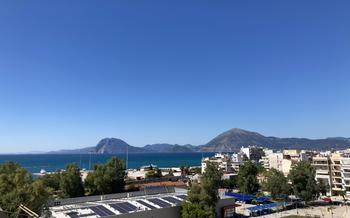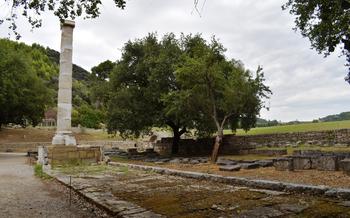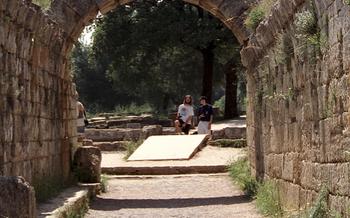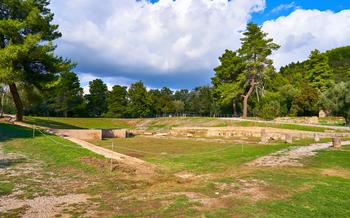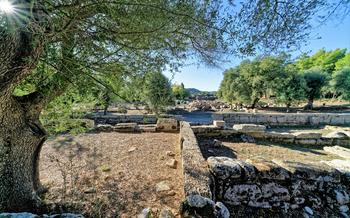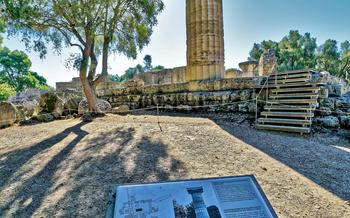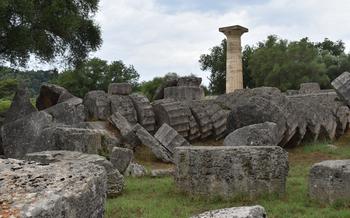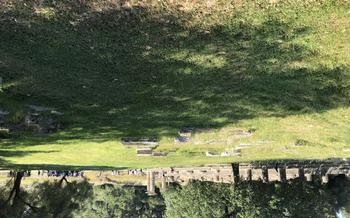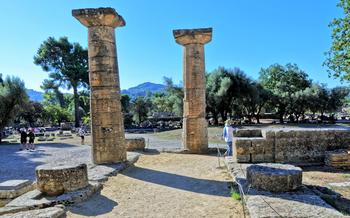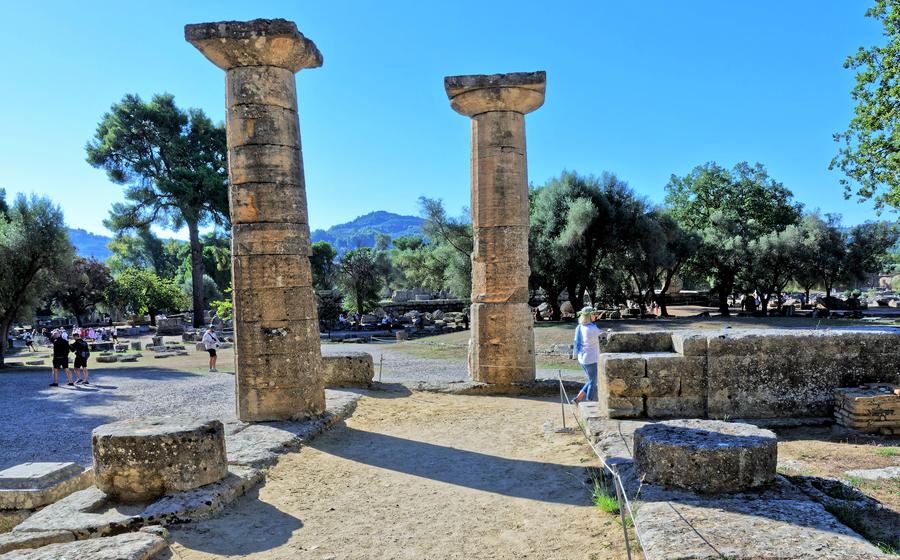
Ancient Ilida
- Unveiling Olympia: The Birthplace of the Olympic Games and Antiquity's Cradle
- Exploring the Archaeological Site: A Journey Through Time
- Witnessing the Olympic Flame Lighting Ceremony
- Paying Homage to Zeus at the Temple of Zeus
- Standing in Awe at the Altar of Olympia
- Racing Through Time at the Ancient Stadium
- Unearthing History at the Museum of Olympia
- Finding Tranquility at the Kladeos River
- Exploring the Ancient City of Elis
- Discovering the Village of Olympia
- Venturing into the Ilida Prefecture
- Unveiling the Temple of Apollo Epicurius
- Exploring the Ancient Theatre of Epidaurus
- Discovering the Mycenaean Palace of Pylos
- Insider Tip: Planning Your Visit
Unveiling Olympia: The Birthplace of the Olympic Games and Antiquity's Cradle
Rooted in the heart of the Peloponnese region, Olympia stands as a testament to ancient Greece's sporting legacy and cultural heritage. As the birthplace of the Olympic Games, Olympia's history is intertwined with legends, myths, and divine interventions. According to Greek mythology, Zeus, the king of gods, vanquished his father, Cronus, in a grand battle that shook the earth. To commemorate this triumph, Zeus established the Olympic Games, which were held every four years to honor his victory and showcase the prowess of ancient athletes. These games were not merely athletic competitions but sacred festivals that celebrated the unity and strength of the Greek world.
Olympia's picturesque surroundings, nestled amidst lush greenery and the Alpheus River, add to its allure. The site's natural beauty and tranquility provide a serene backdrop for exploring the remnants of ancient Greece's sporting traditions. Designated as a UNESCO World Heritage Site, Olympia's significance extends beyond its historical value, embodying the enduring spirit of sportsmanship, competition, and cultural exchange that continues to inspire athletes and spectators worldwide.
Exploring the Archaeological Site: A Journey Through Time
Olympia's ancient athletic facilities stand as testaments to the vigor and competitiveness of the ancient Greeks. Explore the palestra, where athletes honed their wrestling and boxing skills, and the gymnasium, where they trained for running and jumping events. Marvel at the hippodrome, where chariot races unfolded in a blur of hooves and dust.
Unearthed treasures from the site offer a glimpse into ancient Greek artistry. Gaze upon exquisite sculptures, statues, and artifacts that once adorned temples and monuments. These masterpieces, many of which are housed in the on-site Museum of Olympia, showcase the exceptional craftsmanship and creativity of ancient Greek artisans.
At the Museum of Olympia, immerse yourself in the rich history and sporting traditions of Olympia. Interactive exhibits bring ancient Olympia to life, allowing you to experience the thrill of the Olympic Games as if you were there.
Witnessing the Olympic Flame Lighting Ceremony
In a world where unity and peace are paramount, Olympia proudly upholds an ancient tradition that transcends time—the lighting of the Olympic flame. This symbolic ritual, deeply rooted in Greek mythology, has been revived in modern times, perpetuating the Olympic spirit worldwide.
Picture this: the sun dips below the horizon, casting a golden glow over the ancient ruins of Olympia. As darkness envelops the surroundings, a hush falls over the crowd gathered at the Temple of Hera. Anticipation fills the air as the High Priestess, adorned in traditional attire, emerges, carrying a torch.
With a solemn expression, she ignites the flame using the sacred rays of the sun, a gesture that has been passed down through generations. The flickering light dances in the wind, casting an ethereal glow upon the temple's columns. A collective gasp of awe reverberates through the crowd as the Olympic flame is born anew.
From Olympia, the flame embarks on a global journey, carried by torchbearers who traverse land and sea, uniting nations under the Olympic banner. It symbolizes the values of sportsmanship, fair play, and the pursuit of excellence, reminding us that competition can bring people together in harmony.
Witnessing this timeless ceremony is a profound experience that stirs the soul. It is a testament to the enduring legacy of Olympia and the Olympic Games—a tradition that transcends borders and cultures, igniting the flame of unity and peace within us all.
Paying Homage to Zeus at the Temple of Zeus
Unveil the grandeur of the Temple of Zeus, an architectural marvel that once housed one of the Seven Wonders of the Ancient World – the majestic statue of Zeus by Phidias. Constructed in the 5th century BC, this colossal temple served as a testament to the power and glory of the Olympian gods. Imagine the awe-inspiring sight of Zeus's ivory and gold statue, towering over the temple's interior, radiating divine presence. Delve into the temple's rich history, learning about its construction and significance in ancient Greek religious practices. Explore the temple's architectural features, admiring its intricate details and sculptures that narrate mythological tales. As you stand within the temple's walls, feel the echoes of ancient prayers and offerings, connecting you to the spiritual essence of Olympia.
Standing in Awe at the Altar of Olympia
The Altar of Olympia stands as a testament to the grand religious ceremonies that took place in ancient Greece. Measuring over 30 meters in length, this monumental structure was a focal point for sacrifices and offerings made to Zeus, the king of the gods. The altar's imposing size and intricate carvings, depicting mythological scenes and deities, evoke a sense of awe and reverence. Imagine the ancient Greeks gathered around the altar, performing rituals and seeking divine favor. This sacred site offers a glimpse into the deep religious beliefs and practices that shaped ancient Greek culture.
Racing Through Time at the Ancient Stadium
Experience the thrill of standing in the ancient stadium of Olympia, the birthplace of the Olympic Games. Imagine the excitement and energy of the first athletes as they competed in various sports, including running, wrestling, and discus throw. Envision the roar of the crowd cheering on their favorites and the determination of the athletes striving for victory. Explore the stadium's design, including the starting lines, seating arrangements, and victory podium, and let your imagination transport you back to the ancient Olympic Games. Feel the exhilaration of the athletes as they raced through time, leaving an indelible mark on the history of sports and competition.
Unearthing History at the Museum of Olympia
The Museum of Olympia is a treasure trove of artifacts that narrate the captivating history and culture of ancient Olympia. As you step inside, you'll be greeted by an extensive collection of sculptures, statues, and bronzes that showcase the exceptional artistry and craftsmanship of ancient Greek masters. Admire the intricate details and lifelike expressions of these masterpieces, which offer a glimpse into the daily life, religious beliefs, and sporting traditions of ancient Greece.
Among the museum's highlights is the renowned statue of Hermes by Praxiteles, a marble masterpiece that captures the grace and beauty of the Greek god. Don't miss the impressive collection of bronze statues, including the famous "Athlete of Olympia," which portrays an athlete in motion with remarkable realism. These works of art provide a tangible connection to the ancient world and offer insights into the athletic prowess and physical ideals of the ancient Greeks.
In addition to its sculptures, the museum houses a wealth of other artifacts, such as pottery, jewelry, coins, and inscriptions. These objects provide valuable information about the everyday lives of the people of Olympia, their economic activities, and their religious practices. Take your time to explore the various exhibits, which shed light on the rich history of the Olympic Games and the significance of Olympia as a religious and cultural center in ancient Greece.
The Museum of Olympia is not just a repository of artifacts; it's a gateway to the past, allowing you to delve into the fascinating world of ancient Greece. Through its collection, the museum brings to life the stories of athletes, artists, and worshippers who shaped the legacy of Olympia.
Finding Tranquility at the Kladeos River
As you explore the bustling archaeological site, seek solace and tranquility along the banks of the Kladeos River, which meanders serenely nearby. Immerse yourself in the serene landscapes, where the gentle murmur of the river creates a soothing ambiance. Find respite from the sun's embrace beneath the shade of ancient trees that line the riverbank, providing a sanctuary for relaxation and contemplation.
Embrace the opportunity to enjoy a leisurely picnic lunch amidst the picturesque surroundings. Spread a blanket on the lush grass, unpack your delicious Greek delicacies, and savor the flavors while immersing yourself in the tranquil atmosphere. Engage with the local customs and traditions associated with the river, such as religious ceremonies and festivals, which offer a glimpse into the rich cultural heritage of the region.
Exploring the Ancient City of Elis
Elis, an ancient city-state closely intertwined with Olympia's history, beckons with its rich archaeological heritage. Delve into the past at the archaeological site, where remnants of temples, theaters, and fortifications stand as testaments to Elis's grandeur. Discover the fascinating Museum of Elis, showcasing artifacts that paint a vivid picture of the region's bygone era. As you wander through the city, savor the delectable traditional Greek cuisine and local delicacies offered at the charming restaurants and tavernas. Embrace the vibrant spirit of Elis, a city where history, culture, and culinary delights converge.
Discovering the Village of Olympia
Nestled near the archaeological site, the village of Olympia welcomes visitors with its vibrant atmosphere and modern-day charm. Immerse yourself in the local culture as you explore its narrow streets lined with traditional houses, shops, and tavernas. Find a comfortable place to stay at one of the hotels, guesthouses, or vacation rentals that cater to your travel needs.
Indulge in culinary delights at the village's restaurants, cafes, and tavernas, where you can savor traditional Greek cuisine and local specialties. From fresh seafood to mouthwatering grilled meats, the village's culinary scene offers a delightful culinary journey. Don't miss the opportunity to visit local shops, where you can browse for souvenirs, handicrafts, and products inspired by Olympia's rich heritage. Take home a piece of Olympia to cherish your memories of this extraordinary destination.
Venturing into the Ilida Prefecture
Beyond Olympia's ancient wonders, the Ilida prefecture beckons with its diverse natural landscapes and rich cultural heritage. Explore the prefecture's mountainous terrain, lush forests, and picturesque coastal regions, offering a refreshing contrast to the historical sites. Embark on scenic hiking trails that wind through breathtaking landscapes, revealing panoramic views of the surrounding countryside. Discover charming traditional villages nestled amidst olive groves and vineyards, where local culture and traditions thrive. Immerse yourself in the flavors of the region by sampling and purchasing local products, such as olive oil, honey, and wine, directly from the producers. Experience the warmth and hospitality of the local people as you delve into the heart of the Ilida prefecture, creating lasting memories in this unspoiled gem of the Peloponnese.
Unveiling the Temple of Apollo Epicurius
Perched atop Mount Kotyla, amidst a breathtaking natural setting, stands the Temple of Apollo Epicurius, a marvel of ancient Greek architecture. Recognized as a UNESCO World Heritage Site, this remarkably preserved temple is a testament to the skill and artistry of its builders. Dedicated to Apollo, the Greek god of healing and prophecy, the temple exudes an aura of divinity and grandeur. Explore its well-preserved columns, intricate carvings, and stunning pediments, which narrate mythological tales and depict scenes from Greek mythology. As you ascend the hill to reach the temple, be rewarded with panoramic vistas of the surrounding countryside, creating a truly awe-inspiring experience.
Exploring the Ancient Theatre of Epidaurus
Nestled in the Peloponnese region, the Ancient Theatre of Epidaurus stands as a testament to the architectural prowess of ancient Greece. Renowned for its exceptional acoustics, this remarkably preserved theater is one of the most iconic landmarks of the region.
Step into the theater and marvel at its intricate design and impressive features. The seating arrangements, meticulously carved into the hillside, provide an awe-inspiring view of the stage and the surrounding landscape. The stage itself, adorned with intricate carvings and sculptures, offers a glimpse into the grandeur of ancient Greek theater performances.
Immerse yourself in the ambiance of the theater by attending a performance or concert held within its ancient walls. Experience the magic as the actors' voices carry effortlessly to every corner of the auditorium, creating an immersive and unforgettable atmosphere.
Delve deeper into the theater's history and significance by visiting the nearby museum. Discover fascinating artifacts, including masks, costumes, and musical instruments, that shed light on the rich theatrical traditions of ancient Greece.
As you explore the theater, take a moment to appreciate the breathtaking views of the surrounding countryside. The lush greenery, rolling hills, and distant sea create a picturesque backdrop that enhances the overall experience of visiting this ancient wonder.
Discovering the Mycenaean Palace of Pylos
Unveil the secrets of the ancient Mycenaean civilization at the Palace of Pylos, a remarkable archaeological site located in the Ilida prefecture. Step back in time as you explore the fascinating ruins of this Bronze Age palace, dating back to the 13th century BC. Discover the grandeur of the palace's architecture, including its impressive fortifications, elaborate chambers, and intricate drainage system. Unearth the rich history of Pylos through the excavated artifacts, including clay tablets inscribed with Linear B script, gold jewelry, and frescoes depicting scenes from daily life.
At the Museum of Pylos, delve deeper into the palace's history and significance. Admire the collection of artifacts found at the site, including the famous Pylos Combat Agate, which depicts a vivid battle scene. Learn about the palace's role as a center of Mycenaean administration and its connections to other major Bronze Age civilizations.
After exploring the palace, take some time to enjoy the picturesque surroundings of Pylos. Immerse yourself in the lush vegetation and stunning views of the Ionian Sea. Visit the nearby Voidokilia Beach, renowned for its unique horseshoe shape and crystal-clear waters. Indulge in the local cuisine at traditional Greek tavernas, savoring fresh seafood and delicious Peloponnesian dishes.
Insider Tip: Planning Your Visit
To make the most of your visit to Olympia, consider these insider tips:
-
Optimal timing: Plan your trip during the shoulder seasons (spring or autumn) to avoid the crowds and intense summer heat. The weather during these periods is still pleasant, allowing you to comfortably explore the archaeological site and surrounding areas.
-
Guided tours: Enhance your experience by booking a guided tour. Knowledgeable guides can provide valuable insights into the history, mythology, and significance of Olympia, bringing the ancient site to life.
-
Comfortable footwear: Wear comfortable walking shoes as the archaeological site involves uneven terrain and cobblestone paths. You'll be doing a lot of walking, so make sure your feet are well-supported.
-
Sun protection: Greece is known for its sunny weather, so be prepared with sunscreen, a hat, and sunglasses to protect yourself from the sun's rays. The Mediterranean sun can be intense, especially during the summer months.
